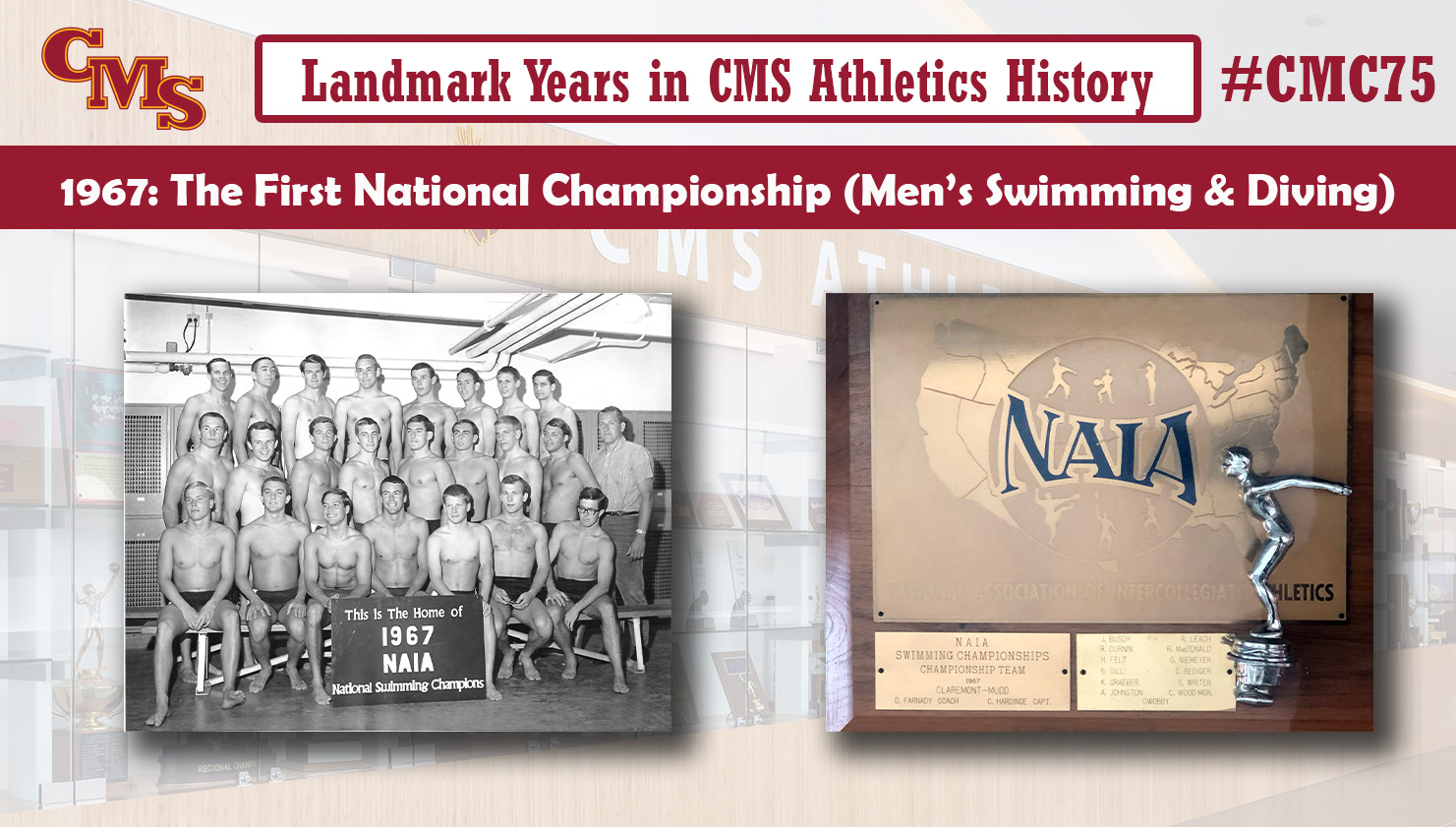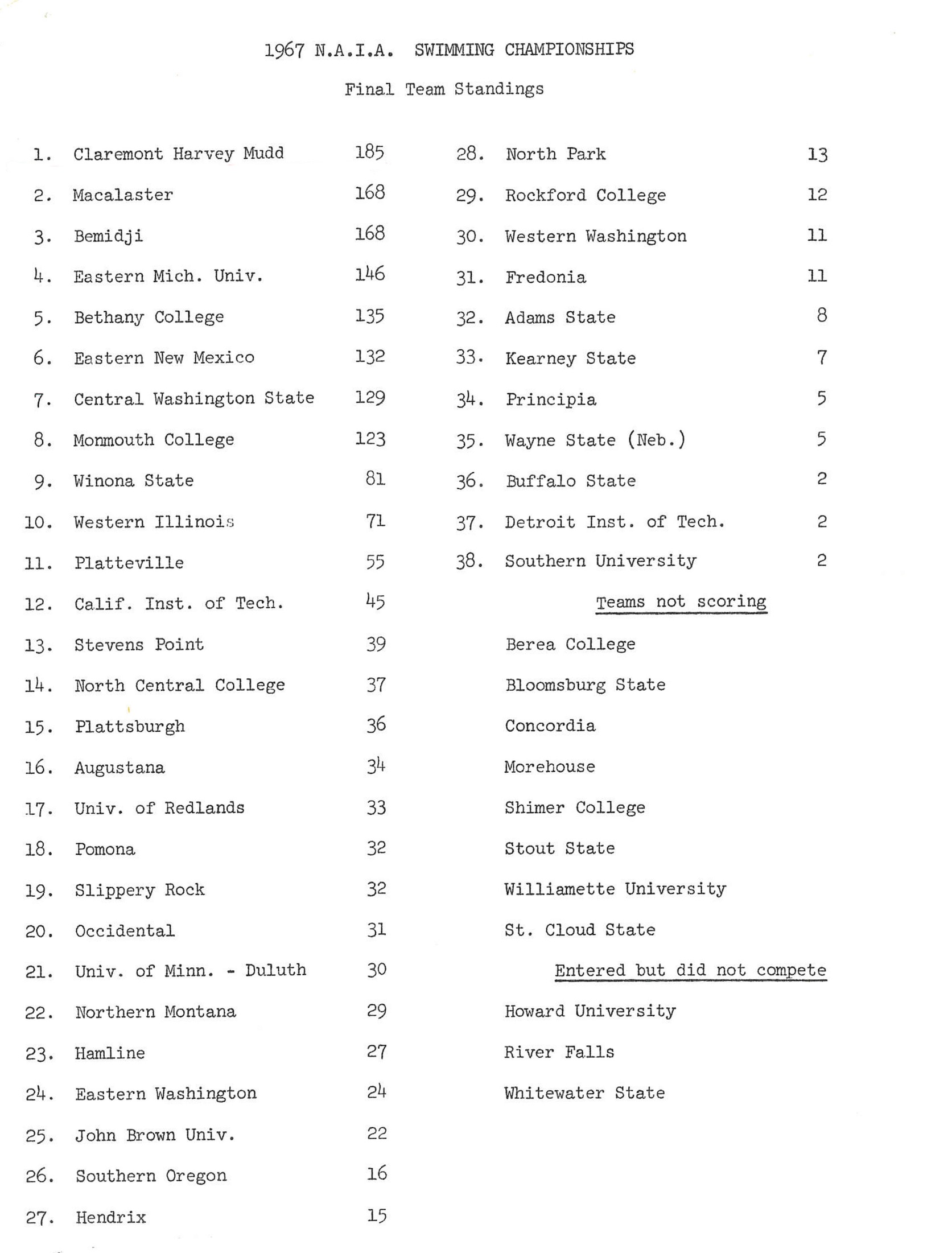
CMC75 Landmark Years (1967): Men's Swimming and Diving Wins Department's First National Title

As part of the buildup to the 75th Anniversary celebration for Claremont McKenna College (visit CMC's 75th Anniversary Countdown Page to learn more), we are reliving many of the great moments and landmark years from CMS athletic department history over the 75-day countdown from April 17 to July 1. If you would like to add to the memories of this moment, or if you would like to submit your memories of your own favorite CMS Athletics moment, fill out the form on our main 75th Anniversary page.
The Claremont-Mudd athletic department was only nine years old when the Stags swimming and diving team stood on the starting blocks for the 800-yard freestyle relay at the 1967 NAIA Championships in Buffalo, with a chance to make history.
You could certainly argue that an athletic department that hadn't even celebrated its 10th birthday didn't have enough in the archives for anyone to truly "make history" just yet. Winning a national championship, though, is clearly an exception -- it's history whenever you are fortunate enough to do it. Just ask the folks next door at Pomona College, who began competing in intercollegiate athletics in 1895 and had to wait almost 100 years for their first national title (women's tennis in 1992).
In only year nine, Claremont-Mudd was faced with a chance to break the national championship ice, even if it was a thin layer of ice, at the 1967 NAIA Swimming Championships. Adding to the drama was that the national title would come right down to the final race. It's somewhat rare for a swim meet to be decided in a winner-take-all on the last relay, but in this case, Claremont-Mudd had just a minuscule three-point lead in the team standings entering the final event. Joe Busch, Alex Johnston, Steve Writer and Cliff Rediger each prepared to each swim 200 yards with a chance to clinch it, but Macalaster or Bemidji were still close enough to leapfrog the Stags if they were to beat them to the wall on the 800th yard.
It is also rare for a program to earn a team championship without winning any races, but the Stags entered the final event in first place by three points, with its highest finish a runner-up (Robin Durnin in the 100 free, and Joe Busch in the 200 fly). Claremont-Mudd used strong swims to gradually accumulate enough points to take the lead, in a meet where no one school was able to dominate the podium.
Getting to the point of being one relay from a national title took overcoming some hurdles. They finished a solid sixth in 1966 in their first trip to the NAIA national meet, under second-year head coach Dez Farnady, one spot ahead of Occidental in seventh. The shoestring budget of a start-up athletic department, though, meant that only six Claremont-Mudd swimmers were able to attend, and there wasn't any guarantee that more would be able to attend in 1967.
The national championship was partially won behind the scenes, as Farnady had to do some politicking to get the squad sized increased to give the Stags a chance at a higher finish. The athletic department was still new, and finding funds to send a large roster to Buffalo on short notice wasn't easy. The early Stags had to make some sacrifices to put their program on the map.
"The 1966 team only had six guys, and the college only paid airfare while we paid our own room and board," said Graeber. "Dez had to sweet-talk the administration to get funding for 12 of us. In Buffalo, we still had to pay for our own food while we stayed at the Howard Johnson's, which was pretty classy in comparison to the truck stop motel from the previous year. After we won the title, everything was paid for."
On the roster, the big loss was the graduation of Scott Campbell, who earned All-America honors in five events in 1966 to help the six-man squad to sixth place. His impact was still on the 1967 squad, though.
"The camaraderie was always special on those teams," said Busch. "To have Scott Campbell, later to be the Danish Olympic coach, as a senior take my freestyle stroke apart and put it back together is just one example. That's the way it was."
Three-year captain Chip Hardinge, Alex Johnston and Karl Graeber were also returning from All-America seasons in 1966 to give the Stags a solid nucleus, and several first-year swimmers made the Stags even deeper. Claremont-Mudd was still looking for the program's first SCIAC title, though, after Occidental had won the last four, which was the first order of business before even thinking about nationals. The Stags took care of that in emphatic fashion, crushing the Tigers 82-21 on their way to a 5-0 SCIAC record and the first conference title in school history. Then the goals started getting higher.
After the cross-country flight and a late arrival in Buffalo, the travel-weary Stags get off to a bit of a slow start, placing in seventh after the first day and looking at an uphill battle to try to fight their way back. Joe Busch was fourth in the 200 IM on opening day, but nobody reached the finals for the Stags in the 500 or the 50, and Claremont-Mudd's fourth-place finish in the 400-yard medley relay (Hardinge, Graeber, Gary Niemeyer, Durnin) wasn't enough to put the Stags in the top five in the team standings.
 Busch helped swing the momentum to start the second day, finishing in second place in the 200 fly in 2:04.41, just three-tenths of a second away from a national title (which he would capture in 1968 to become the first individual national champion in program history). Rediger reached the finals in the 200 free and came in fourth with a time of 1:53.10, and Hardinge reached the finals in the 100 back and came in sixth. Busch added a fourth-place finish in the 400 IM (his third top-four finish in his three individual events) and the 400 free relay (Writer, Rediger, Brian Gill, Durnin) came in third to gradually add to the Claremont-Mudd point total, putting the Stags in third place after the second day, and within striking distance of the championship.
Busch helped swing the momentum to start the second day, finishing in second place in the 200 fly in 2:04.41, just three-tenths of a second away from a national title (which he would capture in 1968 to become the first individual national champion in program history). Rediger reached the finals in the 200 free and came in fourth with a time of 1:53.10, and Hardinge reached the finals in the 100 back and came in sixth. Busch added a fourth-place finish in the 400 IM (his third top-four finish in his three individual events) and the 400 free relay (Writer, Rediger, Brian Gill, Durnin) came in third to gradually add to the Claremont-Mudd point total, putting the Stags in third place after the second day, and within striking distance of the championship.
Bemidji picked up a lot of points in the 1650 to start the final day, with three top-12 finishers, but Johnston came in eighth to keep Claremont-Mudd close. Durnin then came up with a huge swim, taking second in the 100 free in 49.44, matching Busch for the highest individual finish for a Stag over the three-day event and moving the Stags into first place. Hardidge added a fourth-place finish in the 200 back, and Hugh Felt provided some crucial diving points with a seventh-place finish in the three-meter, which left it all up to the 800 free relay.
The drama may have ended on the first 200 yards, as the Stags took a three-second lead over Bemidji and a five-second lead over Macalaster, which were the only two schools which had a chance of passing the Stags. The lead over the co-second place finishers extended to eight seconds over the middle two legs. Eastern New Mexico stayed right on the Claremont-Mudd heels in the relay, but finished in sixth overall for the weekend and weren't a threat to the team title.
By the time the anchor leg came, the Stags were well on their way to clinching the team win, but the race was still up in the air, and Claremont-Mudd still hadn't finished in first place in any event over the three days. Rather than gain the unusual distinction of winning a team championship without winning a race, the Stags put a cap on the first Claremont-Mudd national title by touching the wall in 7:35.15, over a second ahead of Eastern New Mexico and in a new NAIA record time, beating ENMU's old record by over two seconds.
The final win took everyone's contributions, not just the swimmers who won All-America honors. Gill, Niemeyer, Bob Leach, and Ross MacDonald all added to the Claremont-Mudd point total on relays or in consolation heats.
"One of the important items from the 1967 team was that we went with 11 swimmers and a diver, 12 in all," said Busch. "We were somewhat shorthanded compared to some other teams, but every member of that 12-pack scored at least one point, a total team effort."
The Stags would go on to win lots of individual championships over the next few seasons, but Eastern Michigan (which finished fourth in 1967) would be a thorn in the Claremont-Mudd side, winning the 1968-70 titles while the Stags finished second every year (the Stags also finished second in 1972 to Simon Fraser, where members of the Canadian Olympic teams from that era competed). After CMS became an NCAA Division III school in 1976-77, Kenyon would be a similar thorn to the Stags, winning 31 straight national titles from 1980-2010, with CMS finishing second six times, raising its total of national runner-up finishes to 10.
Thanks to the comeback of the 1967 Stags, though, Claremont-Mudd would always be known as a national championship program, a label that was nine years in the making.
The First CMS National Champions
1967 Men's Swimming/Diving Roster
Head Coach: Dez Farnady
Bruce Argall (HMC)
Jeff Bryson (CMC)
Joe Busch (CMC)
Bill Coman (HMC)
Robin Durnin (CMC)
Hugh Felt (CMC)
Brian Gill (CMC)
Mead Greenberg (CMC)
Gene Goltz (HMC)
Bob Groos (CMC)
Karl Graeber (CMC)
Chip Hardinge (CMC)
Jim Hlavka (HMC)
Bill Hutchinson (CMC)
Eric James (CMC)
Jon Johnson (HMC)
Alex Johnston (CMC)
Bob Leach (HMC)
Ross McDonald (CMC)
Stuart Mims (CMC)
Ted Mogey (CMC)
Gary Niemeyer (CMC)
David Preskill (CMC)
Cliff Rediger (CMC)
Bob Struble (CMC)
Bill Watson (HMC)
Steve Writer (CMC)